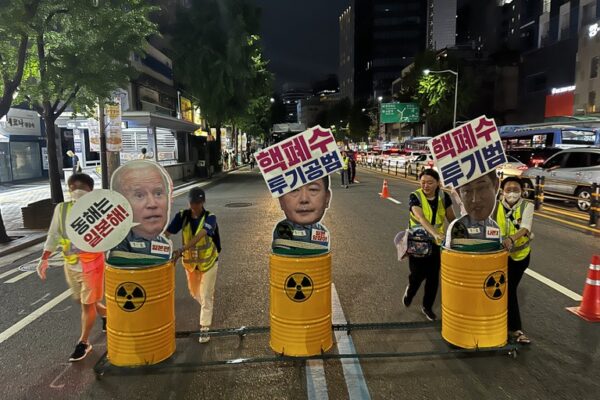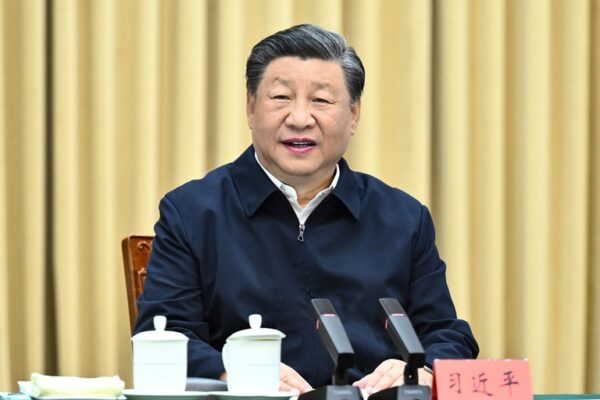
Tens of thousands gather in Seoul to protest Fukushima discharge
Tens of thousands of Koreans gathered in front of Seoul’s City Hall over the weekend to protest Japan’s release of radioactive water from the damaged Fukushima nuclear power plant. Japan started the gradual release of treated radioactive wastewater from the damaged Fukushima Daiichi nuclear power plant into the Pacific Ocean on Aug. 24, despite regional and local concerns, with plans to eventually pump more than a million metric tons of it into the sea. Saturday’s demonstration drew support from more than 80 civic organizations and four political parties, including the main opposition Democratic Party. Spreading across four vehicle lanes, demonstrators voiced their concerns with chants and displayed banners with slogans including, “Immediately stop the Fukushima water release” and “Denounce the Yoon Suk Yeol leadership.” They also asked for a ban on imports of all Japanese aquatic products, urging Korea’s leaders to file a lawsuit against the Japanese government with the United Nations Convention on the Law of the Sea. One of the protesters told Radio Free Asia that she was against the release and the Korean government for not putting pressure on Japan. “I am participating in this protest because I do not trust the Japanese government. I do not believe when they say it won’t have an impact,” Jeong Kim, a 23-year-old Seoul resident, said. “The Korean government should have pressured Japan to let independent scientists verify Tokyo’s claims,” she said. A fisherman said his job would be disrupted due to the release. “Many families like mine, who depend on the ocean for our livelihoods, would face serious consequences,” said Seoung Min, from the southeastern coast. Survey shows widespread concern One of the organizers told RFA she estimated the turnout was more than 50,000 people. After the leaders addressed the main event, various groups marched in different directions around the city, disrupting traffic in many areas. The rally went on for more than four hours. The protest comes just one day after Gallup Korea released a public survey that found three-quarters of Koreans were either “very worried” or “somewhat worried” that the Fukushima discharge would pollute Korea’s oceans and marine products. More than 60% said they were reluctant to consume seafood products. The survey of more than 1,000 Koreans was taken from Aug. 29 to 31 nationwide. Three protesters carry images of US, Japan, and South Korean leaders during a rally against Japan’s release of treated radioactive water from the damaged Fukushima nuclear power plant into the sea in Seoul, Sept. 2, 2023. Credit: Subel Rai Bhandari for RFA Even though Tokyo – and many outside experts – have said the nuclear wastewater is not harmful, many South Koreans and Chinese have been vocal about the potential impact on people’s health and the environment. China has banned imports of Japanese seafood. TEPCO, the Tokyo Electric Power Company, which operates the power plant, which was damaged in a massive tsunami triggered by an earthquake on March 11, 2011, has said that the controlled discharge of the treated wastewater adheres to a meticulous nuclear purification process. The treatment leaves all but one primary radioactive isotope – tritium, which is impossible to separate from water, and so will be diluted to bring it below regulatory standards before the release. Many experts have called for more independent verification of the release plan, alleging that the decision to release the water was reached through a process that lacked full transparency and did not sufficiently include consultations with stakeholders from Japan and other countries. The U.N.’s atomic watchdog, the International Atomic Energy Agency, has been monitoring the release. Last month, it gave Tokyo the green light to start, saying the planned discharge meets relevant international safety standards and would have a “negligible” radiological impact on people and the environment. Over 1.3 million cubic meters of wastewater – enough to fill more than 500 Olympic-size swimming pools – currently contained in numerous water storage tanks at the facility is set to be released, which could take up to 40 years to complete. Edited by Mike Firn and Malcolm Foster.





